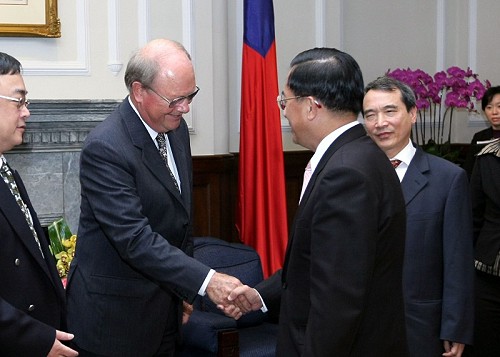News & activities
 News releases
News releases
President Chen Shui-bian's opening remarks at the reception of foreign guests and industry leaders attending the 2007 4th International Magazine Conference of Taipei
Office of the President
Republic of China (Taiwan)
November 21, 2007
Chairperson Wang of the Magazine Business Association of Taipei, President Kummerfeld of the International Federation of the Periodical Press, Distinguished Guests, Friends from the Media, Ladies and Gentlemen:
Good afternoon to you all!
It is a great pleasure to welcome you at the Office of the President. This is the third time I have had the honor of receiving such distinguished guests, many of whom come from abroad, to attend the International Magazine Conference of Taipei (IMCT). First, on behalf of Taiwan's government and people, I would like to extend a warm welcome to all those of you who have traveled from countries around the world to join us here, and also express our praise and respect to the host of this conference for its long-standing commitment to the Asian and global magazine industries.
As indicated by its theme, "Decomposition and Recomposition: Asian Opportunity in the Digital Revolution," this conference will explore the opportunities for Asian and international magazines in the context of globalization and digitalization in the 21st Century. The conference will also consider the restructuring of the magazine industry. Participants will discuss how, in an age of digital revolution, magazine publishers can think beyond conventional business practices, and creatively "decompose" old modes of operation in order to "recompose" them into new approaches, so that the medium of magazines can evolve with the times, embrace the readers of the future, and maintain its competitive edge.
The 2007 Taipei Digital Expo and the 2007 Taipei Digital Expo Forum are being held in conjunction with IMCT. The exposition and the forum will showcase the current developments in Taiwan's magazine industry; expand foreign media professionals' understanding of the trends in Taiwan's digital magazine publishing; create opportunities for dialogue and cooperation between digital content providers and digital publishers; and raise awareness of e-publishing among the public. The exposition is also a visible proof of our government's long-term dedication to cultivating the digital content industry. Indeed, in the face of the rapid development of a global information society, democratic governments around the world have been working hard to ensure the free and safe flow of information.
This year marks the 20th anniversary of the lifting of martial law in Taiwan. Under the rule of the Chinese National Party, or the Kuomintang, Taiwan went through a 38-year-long period of martial law, during which many books and songs were banned, and special inspection agencies were set up to monitor the media, so limiting the content of magazines. Freedom of thought and freedom of the press were tightly controlled.
In the 1980s, I was the director of a political magazine called Formosa Magazine. As the magazine was critical of the government, 51 of its 52 issues were banned. And the one issue that was not banned was used as evidence by the Kuomintang government to persecute and imprison me for libel. Nevertheless, because of the painful experiences of the past, the people of Taiwan now cherish their hard-won democracy and freedom all the more. This explains why we are willing to defend the freedoms of speech, the press, and publication with our very lives.
Since the transfer of power between political parties in 2000, the government has faithfully abided by the Constitution and committed itself to safeguarding the people's freedom of speech and media freedom. The 2007 annual press freedom survey published by the Paris-based Reporters without Borders on October 16, which rates 169 countries, ranked Taiwan No. 1 in Asia and 32nd in the world in terms of press freedom. Taiwan outstripped Japan, which was ranked 37th. China, by contrast, was ranked 163rd--7th from the bottom.
Separately, in the Freedom of the Press 2007 survey published by the Washington-based Freedom House on May 1, Taiwan was ranked No.1 in Asia and 33rd among the 195 countries in the world, again performing better than Japan, which ranked 39th. China, on the other hand, came 181st. The results of these surveys not only demonstrate that Taiwan's commitment to freedom of the press is recognized by the international society; it also shows that your countries and mine share the same objective of liberalizing information on a global scale.
In closing, I would like to once again welcome you all and thank the host for its hard work. I hope that together we can work to further liberalize and broaden the circulation of information, so that the ever-increasing knowledge that the magazine industry shares with the world can become a force for the progress of humanity itself. I wish all of you health and happiness. Thank you!



